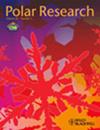阿根廷群岛-基辅半岛地区、南极半岛本地维管植物附近的局部温度:使用标准气象测量的年变化率和近似值
IF 1.3
4区 地球科学
Q3 ECOLOGY
引用次数: 0
摘要
我们描述了影响南极原生维管植物的LT变异的主要特征,并研究了微观层面的温度状况与宏观层面的气象条件之间的关系。我们使用了一年多的时间,在这段时间里,37名专业迷你记录器记录了南极半岛阿根廷群岛-基辅半岛地区维管植物附近的LT。这些记录器不是测量标准的空气或土壤温度,而是在地下附近的维管植物栖息地检测温度。在日常尺度上,LT与标准(2米)空气温度相关,岩石斜坡处的值高于岩石阶地和壁架处的值。风和辐射参数之间存在中度相关性。季节性占总LT变化的75-93%,与保护区和裂隙相比,开放岩石阶地的结果更好。低温在寒冷季节的日常变化是年周期R2差异的主要原因。我们使用附近气象站测得的2米气温和风速的回归相关性来估计日平均LT。这些统计模型的R2在0.46到0.68之间变化。然而,他们低估了观测到的LT。在岩石斜坡上测量的LT显示出更好的空气温度建模结果,而在岩石壁架上风速是更好的预测指标。这项研究有助于我们理解影响本地维管植物的微观尺度温度状况,并提供了一种使用标准气象参数对其进行粗略近似的方法。本文章由计算机程序翻译,如有差异,请以英文原文为准。
Local temperature near native vascular plants in the Argentine Islands–Kyiv Peninsula region, Antarctic Peninsula: annual variability and approximation using standard meteorological measurements
We describe the main features of LT variability that influence native vascular plants in the Antarctic and examine the relationship between the temperature regime at the micro-level and meteorological conditions at the macro-level. We used a period of over a year, during which 37 specialized mini-loggers recorded LT near vascular plants in the Argentine Islands–Kyiv Peninsula region of the Antarctic Peninsula. Rather than measuring standard air or soil temperature, these loggers detect the temperature near the ground, in the microhabitats that harbour vascular plants. On a daily scale, LT correlates with standard (2-m) air temperature, with the values higher at rock slopes than at rock terraces and ledges. A moderate correlation was found with wind and radiation parameters. Seasonality accounted for 75–93% of total LT variability, with better results on open rock terraces compared to protected areas and clefts. LT day-to-day variability during the cold season is mostly responsible for differences in R2 of the annual cycle. We estimated daily mean LT using regression dependencies from 2-m air temperature and wind speed measured at a nearby meteorological station. R2 for these statistical models varies from 0.46 to 0.68. However, they underestimate the observed LT. LT measured on rock slopes showed better modelling results with air temperature, whereas wind speed was a better predictor on rock ledges. This study contributes to our understanding of the micro-scale temperature regime that influences native vascular plants and provides a method for its rough approximation using standard meteorological parameters.
求助全文
通过发布文献求助,成功后即可免费获取论文全文。
去求助
来源期刊

Polar Research
地学-地球科学综合
CiteScore
3.20
自引率
5.30%
发文量
22
审稿时长
>12 weeks
期刊介绍:
Since 1982, Polar Research has been the international, peer-reviewed journal of the Norwegian Polar Institute, Norway''s central institution for research, environmental monitoring and mapping of the polar regions. Aiming to promote the exchange of scientific knowledge about the Arctic and Antarctic across disciplinary boundaries, Polar Research serves an international community of researchers and managers. As an open-access journal, Polar Research makes its contents freely available to the general public.
Original primary research papers comprise the mainstay of Polar Research. Review articles, brief research notes, letters to the editor and book reviews are also included. Special issues are published from time to time.
The scope of Polar Research encompasses research in all scientific disciplines relevant to the polar regions. These include, but are not limited to, the subfields of biology, ecology, geology, oceanography, glaciology and atmospheric science. Submissions from the social sciences and those focusing on polar management and policy issues are welcome. Contributions about Antarctica are particularly encouraged.
 求助内容:
求助内容: 应助结果提醒方式:
应助结果提醒方式:


